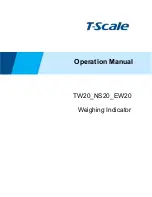
Troubleshooting
The Model 2015A AMP/TSCA is designed and constructed to provide reliable trou-
ble-free service with normal usage and care in operation. Should module malfunction
occur, the following information is provided to facilitate troubleshooting of the
AMP/TSCA. Information contained in other sections of this manual should be used
along with the following information to aid in locating the source of trouble.
Troubleshooting Aids
• Test Equipment (refer to “Equipment Required” on page 20)
• NIM Module Power Extender Cable Canberra Model C-1403
• Detailed Block Diagram Drawing B-17635
• Circuit Schematic Drawing B-17636
Troubleshooting Techniques
1.
Check Control Settings.
The first and most important prerequisite for
successful troubleshooting is a thorough understanding of module operation
and function. Often, suspected malfunctions are caused by improper control
settings. The troubleshooting aids and techniques should be applied only
after it has been firmly established that the difficulty cannot be eliminated by
the Operating Instructions, refer to page 7.
2.
Check Associated Equipment.
An investigation should be made to ensure
that the trouble is not a result of conditions external to the Model 2015A.
Check that the equipment used with this instrument is operating correctly.
Make certain that signals are properly connected and that the interconnecting
cables are not defective. Also, check the power source. The substitution
method can be applied to check for proper operation of the Model 2015A if
another similar type unit is available.
3.
Visual Check.
Conduct a visual inspection of the Model 2015A for possible
burned or unsoldered components, broken wires or any other obvious
conditions which might suggest a source of trouble.
4.
Isolate Trouble to a Circuit.
To isolate trouble to a particular circuit, note
the trouble symptom. The symptom often identifies the circuit in which the
trouble is located. When trouble symptoms appear in more than one circuit,
check affected circuits by taking voltage and waveform readings. Incorrect
operation of all circuits often indicates trouble in the power supply (internal
or external). However, defective components in the module can appear as a
power supply trouble and may affect the operation of other circuits. After the
37
Troubleshooting
Summary of Contents for 2015A
Page 1: ...Model 2015A Spectroscopy Amplifier Timing SCA User s Manual 9231694B 01 05...
Page 6: ...Notes iv...
Page 12: ...Internal Controls 6 Controls and Connectors Figure 4 Internal Controls...
Page 55: ......
Page 56: ......














































